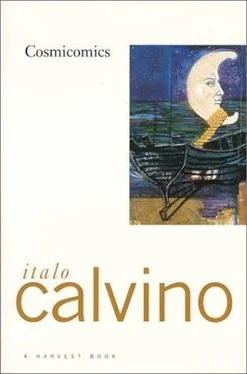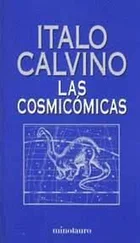We got up. Mr. Hnw and Granny were in front of us, crying, surrounded by pale blue-and-gold flames.
"Rwzfs! Why have you set fire to Granny?" Father began to scold, but, turning toward my brother, he saw that Rwzfs was also enveloped in flames. And so was my father, and my mother, too, and I – we were all burning in the fire. Or rather: we weren't burning, we were immersed in it as in a darling forest; the flames shot high over the whole surface of the planet, a fiery air in which we could run and float and fly, and we were gripped by a kind of new joy.
The Sun's radiations were burning the envelopes of the planets, made of helium and hydrogen: in the sky, where our uncles and aunt were, fiery globes spun, dragging after them long beards of gold and turquoise, as a comet drags its tail.
The darkness came back. By now we were sure that everything that could possibly happen had happened, and "yes, this is the end," Grandmother said, "mind what us old folks say…" Instead, the Earth had merely made one of its turns. It was night. Everything was just beginning.
Situated in the external zone of the Milky Way, the Sun takes about two hundred million years to make a complete revolution of the Galaxy.
Right, that's how long it takes, not a day less, – Qfwfq said, - once, as I went past, I drew a sign at a point in space, just so I could find it again two hundred million years later, when we went by the next time around. What sort of sign? It's hard to explain because if I say sign to you, you immediately think of a something that can be distinguished from a something else, but nothing could be distinguished from anything there; you immediately think of a sign made with some implement or with your hands, and then when you take the implement or your hands away, the sign remains, but in those days there were no implements or even hands, or teeth, or noses, all things that came along afterwards, a long time afterwards. As to the form a sign should have, you say it's no problem because, whatever form it may be given, a sign only has to serve as a sign, that is, be different or else the same as other signs: here again it's easy for you young ones to talk, but in that period I didn't have any examples to follow, I couldn't say I'll make it the same or I'll make it different, there were no things to copy, nobody knew what a line was, straight or curved, or even a dot, or a protuberance or a cavity. I conceived the idea of making a sign, that's true enough, or rather, I conceived the idea of considering a sign a something that I felt like making, so when, at that point in space and not in another, I made something, meaning to make a sign, it turned out that I really had made a sign, after all.
In other words, considering it was the first sign ever made in the universe, or at least in the circuit of the Milky Way, I must admit it came out very well. Visible? What a question! Who had eyes to see with in those days? Nothing had ever been seen by anything, the question never even arose. Recognizable, yes, beyond any possibility of error: because all the other points in space were the same, indistinguishable, and instead, this one had the sign on it.
So as the planets continued their revolutions, and the solar system went on in its own, I soon left the sign far behind me, separated from it by the endless fields of space. And I couldn't help thinking about when I would come back and encounter it again, and how I would know it, and how happy it would make me, in that anonymous expanse, after I had spent a hundred thousand light-years without meeting anything familiar, nothing for hundreds of centuries, for thousands of millennia; I'd come back and there it would be in its place, just as I had left it, simple and bare, but with that unmistakable imprint, so to speak, that I had given it.
Slowly the Milky Way revolved, with its fringe of constellations and planets and clouds, and the Sun along with the rest, toward the edge. In all that circling, only the sign remained still, in an ordinary spot, out of all the orbit's reach (to make it, I had leaned over the border of the Galaxy a little, so it would remain outside and all those revolving worlds wouldn't crash into it), in an ordinary point that was no longer ordinary since it was the only point that was surely there, and which could be used as a reference point to distinguish other points.
I thought about it day and night; in fact, I couldn't think about anything else; actually, this was the first opportunity I had had to think something; or I should say: to think something had never been possible, first because there were no things to think about, and second because signs to think of them by were lacking, but from the moment there was that sign, it was possible for someone thinking to think of a sign, and therefore that one, in the sense that the sign was the thing you could think about and also the sign of the thing thought, namely, itself.
So the situation was this: the sign served to mark a place but at the same time it meant that in that place there was a sign (something far more important because there were plenty of places but there was only one sign) and also at the same time that sign was mine, the sign of me, because it was the only sign I had ever made and I was the only one who had ever made signs. It was like a name, the name of that point, and also my name that I had signed on that spot; in short, it was the only name available for everything that required a name.
Transported by the sides of the Galaxy, our world went navigating through distant spaces, and the sign stayed where I had left it to mark that spot, and at the same time it marked me, I carried it with me, it inhabited me, possessed me entirely, came between me and everything with which I might have attempted to establish a relationship. As I waited to come back and meet it again, I could try to derive other signs from it and combinations of signs, series of similar signs and contrasts of different signs. But already tens and tens of thousands of millennia had gone by since the moment when I had made it (rather, since the few seconds in which I had scrawled it down in the constant movement of the Milky Way) and now, just when I needed to bear in mind its every detail (the slightest uncertainty about its form made uncertain the possible distinctions between it and other signs I might make), I realized that, though I recalled its general outline, its over-all appearance, still something about it eluded me, I mean if I tried to break it down into its various elements, I couldn't remember whether, between one part and the other, it went like this or like that. I needed it there in front of me, to study, to consult, but instead it was still far away, I didn't yet know how far, because I had made it precisely in order to know the time it would take me to see it again, and until I had found it once more, I wouldn't know. Now, however, it wasn't my motive in making it that mattered to me, but how it was made, and I started inventing hypotheses about this how, and theories according to which a certain sign had to be perforce in a certain way, or else, proceeding by exclusion, I tried to eliminate all the less probable types of sign to arrive at the right one, but all these imaginary signs vanished inevitably because that first sign was missing as a term of comparison. As I racked my brain like this (while the Galaxy went on turning wakefully in its bed of soft emptiness and the atoms burned and radiated) I realized I had lost by now even that confused notion of my sign, and I succeeded in conceiving only interchangeable fragments of signs, that is, smaller signs within the large one, and every change of these signs-within-the-sign changed the sign itself into a completely different one; in short, I had completely forgotten what my sign was like and, try as I might, it wouldn't come back to my mind.
Читать дальше












